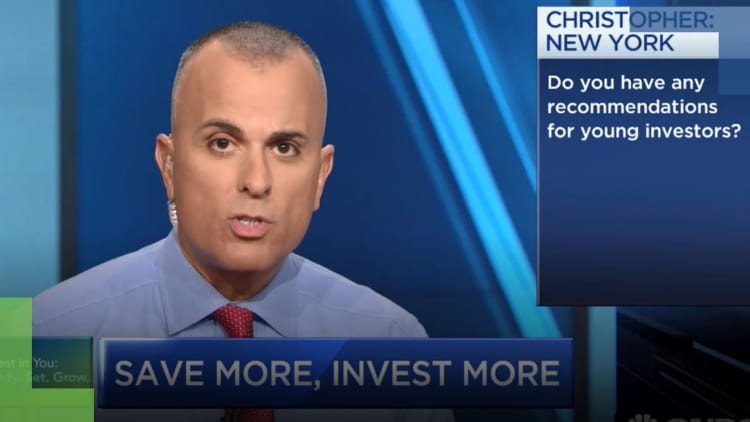For a taboo subject, a lot of people like talking about money.
Like-minded friends are an obvious choice, but you can also find your community online.
People join weight loss and exercise groups because they know it's easier to stick to those goals when you have company.
It also makes you accountable. If it's just you, you can backslide pretty easily, because who's going to know? Whether it's in person or online, a community of peers can be a great way to sharpen your financial skills.
Talking about money with people you know has pros and cons, says Nicholas Arreola, chief behavioral scientist and analytics officer at CLS Investments in Omaha, Nebraska.
More from Invest in You:
Rent or buy refurbished so you can truly invest
Make 5 tweaks to summer spending to be richer this fall
You'll probably regret that timeshare and car payments
Venting to a friend can release bottled-up financial anxiety, says Arreola. It can also help you gain clarity and perspective.
Arreola's own generation — "dare I say the 'M word'?" he said — is well known for its high levels of student loan debt. He took comfort in commiserating with close friends from college about the challenge. "I [can] end up walking away with tips and tricks for paying down this debt and feeling in control of it," Arreola said.
Just keep an eye out for sketchy information or people who filter their comments in order to preserve the relationship. "Put simply, your friends or family may hold back good advice that you need to hear — the cold hard truth — in order to avoid confrontation or conflict," Arreola said.
Women and money
It's not always as easy for women to find their community, though, says Alicia McElhaney, 25, a business reporter who lives in Brooklyn, New York. McElhaney started She Spends — a website and newsletter — to help women grow more comfortable with finance.
"The goal is to get more women to use their financial power," McElhaney said, "and we do have financial power." As noted on the She Spends site, women make up nearly half the labor force and hold more advanced degrees than men. The site gives women and nonbinary people the tools to close the gaps in wages, investing and board seats.
Interest in personal finance has been on the rise, with an accompanying spike in websites and experts on the subject. But McElhaney says it still takes more time to find information directed at women.
Many personal finance or investing groups and websites are male-centric. "In some online circles, there isn't a lot of conversation about the wage gap or why women might not be investing," McElhaney said. And in some online forums, such as several financial independence, retire early (FIRE) communities, discussion of gender issues and the wage gap is banned, according to McElhaney.
P2P learning
If you're a little afraid of the top experts, take heart. "When you hear, 'I'm doing X-Y-Z with my finances and now I'm a millionaire!' that really is intimidating," said McElhaney.
Learning from your peers or from people who look and talk like you — instead of lofty financial experts — has a lot to offer.
The heart of McElhaney's mission is in the She Spends Facebook group. "Talking to people who are one or two steps ahead of you, that can really help," McElhaney said. Members tend to look after each other, McElhaney says, especially when they have similar goals. "Having someone check in is hugely helpful," she said.

Group members exchange information and advice on budgeting software, investing in retirement accounts, index funds and exchange-traded funds and personal finance tracking apps.
Jordan Kifer, 28, is delighted to be more of a financial resource to other women. "Talking about personal finance and education is a big gap that I think is in the process of being filled," she said. "It's nice to see women self-educating and passing [that knowledge] on."
A woman asked the group for advice on whether she should apply for a promising job. "I don't have every single box checked," she said. The group pressed her to apply, and she did. She got the job, a 10% higher salary than originally offered, as well as a better title than offered because the group encouraged her to negotiate.
'The questions started pouring out'
Cali A., 31, works as a program manager for a nonprofit organization in Washington, D.C. She prefers not to disclose her last name. Two years ago, Cali started reading up on personal finance and trying to understand where her money was going. Then, she told her friends. "The questions started pouring out," she said.
Cali, who now has her own personal finance blog, says it's a more natural and efficient way to learn. "Having someone tell you in plain English the difference between a Roth IRA and a 401(k)" is much easier," she said.
You can't always turn to the usual outlets, either, Cali says. "I think at this age we're expected to know what some of these things are," she said. Asking your employer or the HR people would make you appear foolish: Why haven't you learned this by now? "People are super-intimidated," she said. "I didn't want my friends to have the same bumpy road."
For anyone thinking that it's foolhardy to get financial advice from a nonprofessional, Cali says it's similar to friends giving each other relationship advice. "I'm not an expert, but I've been in relationships," she said. "I have useful advice to pass on."
CHECK OUT: 3 steps to take if you want to retire by 65 via Grow with Acorns+CNBC.
Disclosure: NBCUniversal and Comcast Ventures are investors in Acorns.





